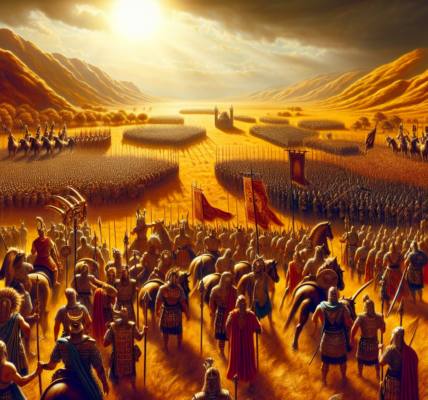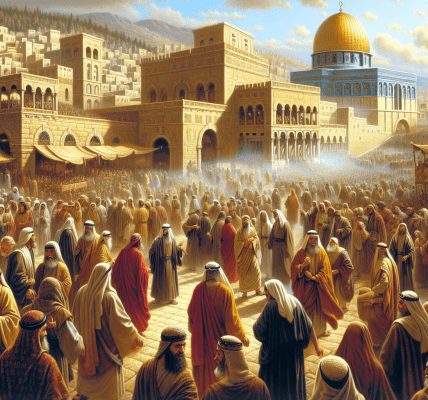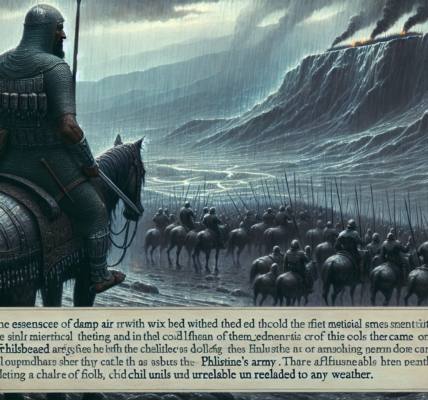**The Lamentation Over Tyre: The Fall of a Glorious Merchant City**
The word of the Lord came to Ezekiel, saying, *”Son of man, take up a lamentation for Tyre.”* And so, with a heavy heart, the prophet lifted his voice, mourning the fate of the once-magnificent city that had sat proudly upon the coast, a jewel of the sea.
### **The Splendor of Tyre**
Tyre was a city of unmatched beauty and wealth, a merchant of the nations, dwelling at the gateway of the seas. Her builders had perfected her beauty, crafting her like a mighty ship adorned for glory.
Her hull was fashioned from the finest fir trees of Senir, towering cedars from Lebanon were brought for her masts. The oaks of Bashan were shaped into her oars, while her deck was inlaid with ivory, polished and gleaming, imported from the coasts of Cyprus.
Her sails were made of fine embroidered linen from Egypt, rippling like banners in the wind, a royal display for all to see. Her canopies were woven in blue and purple, the colors of kings, dyed with the rare pigments of the Elishah coast.
### **The Merchants and Their Wares**
Men of Sidon and Arvad rowed her as skilled sailors, while the wisest of Tyre herself stood as her captains, guiding her through the waves with unmatched knowledge. The elders of Gebal, master craftsmen, labored within her, caulking her seams to keep her strong against the tides.
All the ships of the sea and their sailors came to trade within her markets, bringing silver from Tarshish, iron from Dan and Javan, cassia and calamus from distant lands. Damascus sent wine of Helbon and wool of Zahar, while Vedan and Javan traded wrought iron, bright as the morning sun.
Dedan brought saddlecloths for riding, Arabia and the princes of Kedar offered lambs, rams, and goats. The merchants of Sheba and Raamah dealt in spices, precious stones, and gold. Haran, Canneh, Eden, and Assyria brought the finest fabrics, cloaks of blue and carpets of multicolored thread.
The ships of Kittim carried goods to her ports, filling her storehouses with ivory tusks and ebony wood. Aram traded emeralds, purple cloth, and fine linens, while Judah and Israel brought wheat from Minnith, honey, oil, and balm.
### **The Pride and the Fall**
With such riches, Tyre grew proud, her heart swelling with arrogance. She saw herself as perfect in beauty, unrivaled among the nations. Her merchants were princes, her traders the honored of the earth.
But the Lord declared: *”Because you have exalted yourself, saying, ‘I am a god; I sit in the seat of the gods, in the heart of the seas,’ yet you are but a man and no god—therefore, behold, I will bring strangers against you, the most ruthless of nations.”*
And so, the armies of Babylon came, the terror of the mighty. They would draw their swords against the beauty of Tyre’s wisdom, defile her splendor, and cast her down to the pit.
Her merchants, once princes, would tremble. Her mariners, the seasoned men of the sea, would cry out in fear as the waves swallowed her. The sound of her collapse would shake the coasts, and all who sailed the waters would mourn, astonished at her ruin.
### **The Lament of the Nations**
The merchants among the nations would hiss at her fate, for in one hour, all her glory had been laid waste. The sailors and captains would stand afar off, weeping, casting dust upon their heads, crying:
*”Who was ever silenced like Tyre, surrounded by the sea?”*
Once, her trade had satisfied many nations; her wealth had enriched the kings of the earth. But now, she was broken by the waves, sunk into the depths, her riches and her people vanished in the midst of the waters.
And so, the word of the Lord was fulfilled. The city that had called herself a goddess was no more, and the nations learned that pride comes before destruction.
Thus ends the lamentation for Tyre.



